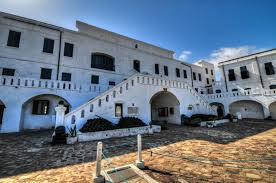 The Elmina Castle
The Elmina Castle
Elmina Castle stands as a haunting reminder of a dark chapter in human history.
This impressive appearance, with its fortress-like architecture, witnessed the horrors of the foreign slave trade for over four centuries.
Today, Elmina Castle serves as a heartbreaking symbol of resilience and a testament to the unwavering spirit of those who survived its walls.
The Castle was constructed by the Portuguese in 1483, making it the oldest European building in sub-Saharan Africa. Originally, it was intended as a trading post for gold and ivory however, it became a hub for the foreign slave trade. The Castle changed hands multiple times. During the time of the Dutch, they extended the castle and added cramped cells,” Door of No Return” through which enslaved Africans were forced into ships bound for the Americas.
The Castle dungeons, with their suffocating conditions and inhumane treatment, were a living hell for those waiting for their fates. The echoes of their suffering can still be heard on the walls, serving as a reminder of the cruel acts committed during the dark period of history.
Micheal Blackson, his wife, and friends shed tears as they visit the Elmina castle to discover how Africans suffered in the hands of the Europeans and even requested that if there’s a video, they would like to watch it. They felt heartbroken on hearing about the dark side of Elmina Castle.
Through all the suffering that took place at Elmina Castle, it ceased its role in the slave trade, making the beginning of a new era for this historic landmark. The Castle has undergone significant restoration efforts to preserve its historical significance and educate visitors about its painful past.
Today, Elmina Castle has become a powerful site for reconciliation and healing. It serves as a place where people from all walks of life can come together to reflect on the shared history of humanity and pledge to build a better future.
In conclusion, Elmina Castle stands as a testament to the defeat of the human spirit and the power of remembrance. Its transformation from a site of immense suffering to a beacon of hope and reconciliation is a heartbreaking reminder that, despite the darkness of our past, we can strive towards a future of unity, and understanding. It also helps us to confront injustice and work towards a world where such cruel acts are never repeated.